Wynton Marsalis tours with Jazz at Lincoln Center Orchestra
School students in Canberra have had the chance this week to learn from one of the great modern masters of jazz, Wynton Marsalis.
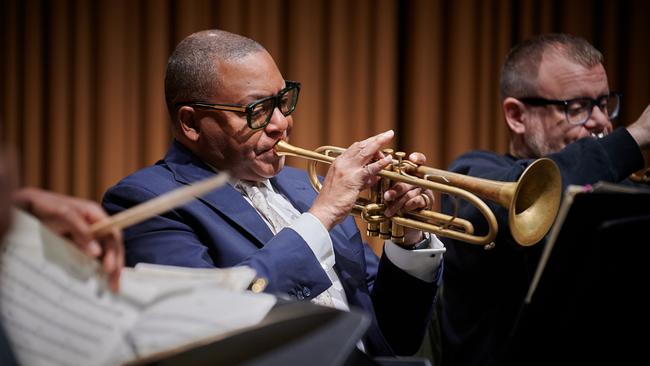
Wynton Marsalis is a trumpeter, band leader, artistic director and teacher, but speaking to him can almost sound like a session with a life coach. Jazz, in his view, is not only a genre of music, an application of technique, but involves the cultivation of personal values.
“The fundamentals of our music apply to anything in life,” he says. “The main things are how to exercise choice: that means you develop acuity, to understand the difference between things, discernment …
“You have something that makes you unique: identify that and work on it. And with that is also respect for others. Nurture the common space. The main thing the music teaches, in the way it’s played, is that you have to focus on every beat, even when they are going by so quickly. The groove requires constant attention.”
A singular figure in jazz, and in music generally, Marsalis has returned to Australia this week for a concert tour with the Jazz at Lincoln Center Orchestra, from New York. The four-city tour includes dates with symphony orchestras and performances of his epic 12-part jazz oratorio, All Rise.
In a rare opportunity for young music students, Marsalis and the JLCO have a four-day residency at the Snow Concert Hall, a terrific new auditorium at Canberra Grammar School. He and the band have been rehearsing there this week and some of the players will host workshops for music students there on Friday.
“If you are serious (about learning), the technical parts are the easiest parts, because if you work on them systematically, they’ll improve,” Marsalis says. “Things like self-awareness, awareness of others, emotional intelligence, good decision-making, acceptance of a role, the inherent unfairness of life – to not let it overwhelm you.”
He sets out his non-negotiable characteristics of jazz music, being improvisation, the feeling of the blues, and the rhythmic propulsion of swing.
“Swing is probably the most difficult concept, because it means you have to sit comfortably in the discomfort of someone whose point of view is not your own,” he says.
“It’s give and take, it’s friction. The drums play a pattern in three, and the bass is playing in two. That three and that two are sounding at the same time. They are working it out. There is no right or wrong, it’s a balance. Constant maintenance of equilibrium.
“You have to sit in constant discomfort and be comfortable with that. To teach kids those basic skills without being didactic is always what the music does, and the best example is playing it.”
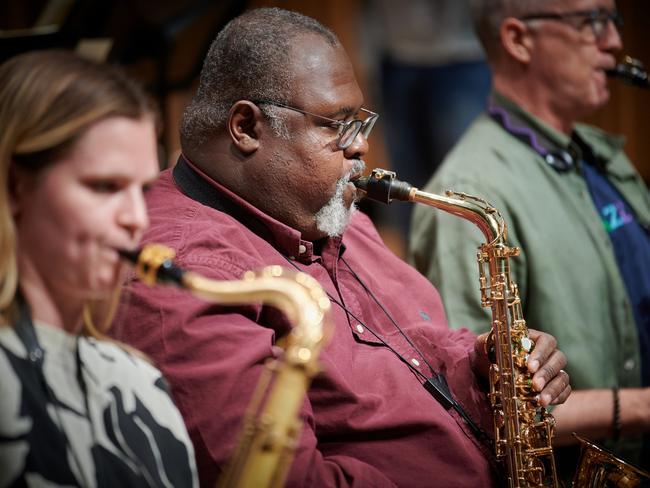
Marsalis and his band showed their chops at a closed rehearsal at the Snow Concert Hall on Tuesday. The hall has a crisp acoustic, so that the drums sound clean and bass can be heard. The horns and reeds are punchy, and fortissimos come across as a thrilling blast of energy. Marsalis leads from the trumpets at the back, giving directions but also deferring to other players in the group. There is a wealth of musical experience on stage, where each player could be a soloist.
Marsalis, 61, has just flown in from Europe where he and the group have been on tour. He agrees to meet for a breakfast interview, and arrives wearing a beanie and grasping a cup of coffee, affable and chummy.
He’s been in the public eye since he was a teenager. He’d grown up around jazz – his father, Ellis Marsalis Jr, was a pianist and teacher in New Orleans, and three of his brothers also are well-known musicians – but his musical journey led him first to Juilliard and studies in classical trumpet. Word started to get around about the gifted hornblower, and he later recorded an album of concertos by Haydn, Hummel and Leopold Mozart. Not bothering to finish his formal studies, he joined Art Blakey and the Jazz Messengers on tour and he was on his way.
Would he recommend young people start in classical studies before jazz?
“My grounding was always in jazz because my daddy is a jazz musician,” he says of his father, who died of Covid-related causes in 2020. “I was always around jazz musicians. I studied classical music because I liked it. A guy gave me some records and I thought, ‘I like this music too’.
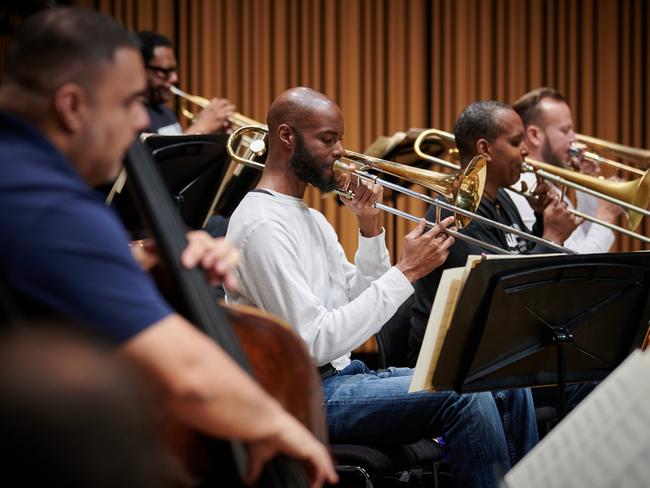
“The greatest jazz musicians did not have a grounding in classical music. They had a grounding in music. That could be any style, any form, and then you can learn the fundamentals of jazz and apply whatever music you know to those fundamentals. You could be a person who grew up playing a form of traditional music in Cuba and you could become a jazz musician. Or you grew up playing folk music in Chile, and you could play jazz.”
In 1987 he released his Grammy-winning disc, Marsalis Standard Time, Vol. 1, and in the same year helped launch a jazz season at New York’s Lincoln Center. Jazz at Lincoln Center is now a stand-alone entity, and Marsalis has been its artistic director ever since. With its year-round program of gigs, tours by the JLCO, commissions and an education program, Jazz at Lincoln Center positions jazz alongside the classical traditions of the New York Philharmonic and the Metropolitan Opera.
Marsalis is proud that Jazz at Lincoln Center has helped promote an appreciation of the music. But he has certainly not been without critics who have, over the years, regarded him as a protector of his own version of jazz – that is to say, straight-ahead or conservative – and less interested in experimentation.
In the past it brought him into conflict with Miles Davis and his jazz fusion compositions, such as on Bitches Brew. When Marsalis was in his mid-20s he gatecrashed a Davis gig as if to have a duel with him, trumpet to trumpet. The older musician told him in no uncertain terms to get off the stage.
Marsalis says he didn’t mind the contest of ideas and explains the contretemps over Davis’s fusion music as a misunderstanding. “He didn’t call it jazz,” he says. “He said it was social music.”
More recently, Marsalis has been outspoken about hip-hop and elements of that music he regards as violent, profane, pornographic and playing into racial stereotypes. He does not venture into that subject in this interview but holds firm against what he regards as corrupting influences on jazz, on music, and on society more generally. Part of his mission at Jazz at Lincoln Center has been to maintain some kind of standard of what jazz is.
“We are trying to make sure that future generations can play it,” he says. “It’s a very interesting art form, where it lies. It is perhaps the only art form where the corruption of it is considered to be the achievement, and people not playing it are celebrated.”
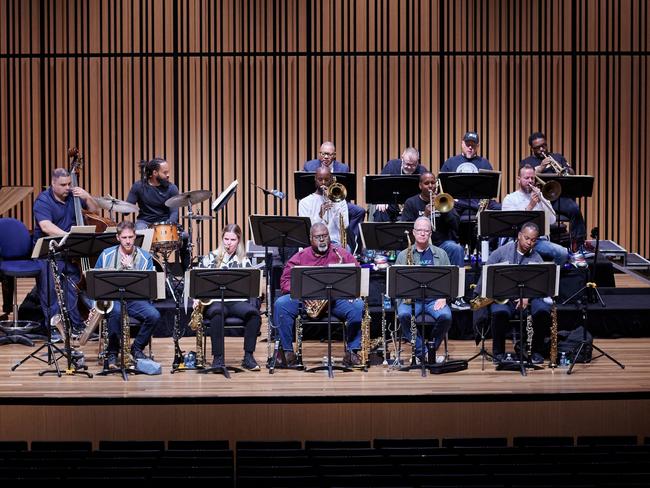
The Snow Concert Hall is named for Canberra businessman and philanthropist Terry Snow, whose Snow Foundation gave $20m to build it. “It’s a beautiful building, it sits in the landscape of the school, and I think the architects did such a terrific job,” Snow says. “I think it will be a joy for people for many years to come.”
It is indeed a beautiful venue. Designed by Cox Architecture, and with acoustic engineering by Marshall Day, the hall sits below ground level, so the bulk of the structure does not obscure the 1920s heritage buildings around the school’s quadrangle.
The auditorium seats 936 in the stalls, and another 400 in the balcony. The building includes music rehearsal studios and, above ground, a foyer, school cafe and library.
Snow, and Canberra Grammar School head Justin Garrick, say the hall will welcome students from other schools and music lovers from the Canberra community, so it becomes an addition to the cultural facilities of the national capital.
The school engaged flute soloist and concert producer Ana de la Vega to devise an international series for the hall. There have already been concerts by the Melbourne Chamber Orchestra and pianist Piers Lane, but the coup was securing Marsalis and band to spend four days at the school.
Year 10 students Edie Hawke and James Biddington, both trumpet players, recognise the enormous investment in music that is the Snow Concert Hall. This week they have been watching rehearsals with Marsalis and the JLCO, and will take part in band workshops with the musicians on Friday.
“The way they conduct themselves at a professional level is just insane,” Hawke says. “More than their specific technique, it’s seeing how it works in the bigger picture.”
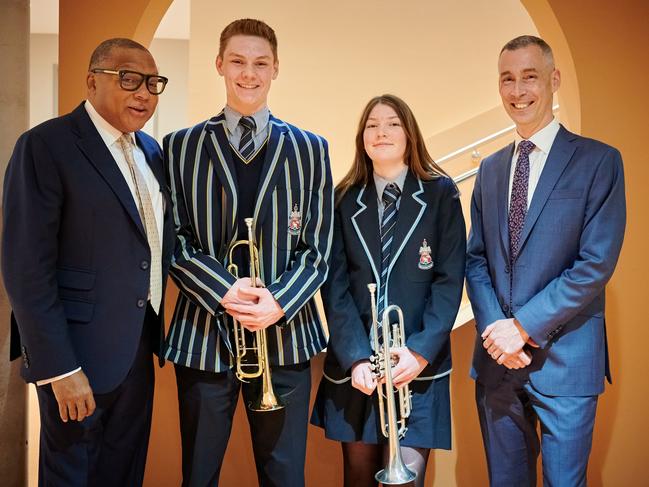
Marsalis has produced large-scale compositions that draw on classical forms such as oratorio and symphony, and also on jazz concert suites in the tradition of Duke Ellington. His 1997 oratorio about the history of slavery in the US, Blood on the Fields, was written for the JLCO and vocalists, and won the Pulitzer Prize for Music. Kurt Masur, music director of the New York Philharmonic through the 1990s, encouraged him to broaden his palette by writing for symphony orchestra. On his last Australian tour in 2019 he presented his fourth symphony for jazz band and orchestra, The Jungle, and made a recording of it with the Melbourne Symphony Orchestra, which has just been released.
His 1999 oratorio, All Rise, written for the JLCO, symphony orchestra and large chorus, is a 12-movement work whose structure refers to the 12-bar blues. It was first performed with the New York Phil and on his current tour Marsalis will present it with the MSO and the Sydney Symphony Orchestra.
For the composer and soloist whose musical life has straddled both the classical and jazz worlds, the piece is a demonstration of his belief in the primacy of melody.
“That’s the outward face, the identity, the humanity, the humility of the music,” he says. “That’s the chance you have – if a person wants to hear a longer piece, they can follow the melody. Once you take that away, you narrow your list of people. I never wanted my book to be so small that they had to be cognoscenti. I was never interested in that.”
Wynton Marsalis and Jazz at Lincoln Center Orchestra appear at Canberra Grammar School, August 18; Arts Centre Melbourne, August 20-26; Sydney Opera House, August 30-September 3; QPAC, Brisbane, September 4-5.

To join the conversation, please log in. Don't have an account? Register
Join the conversation, you are commenting as Logout